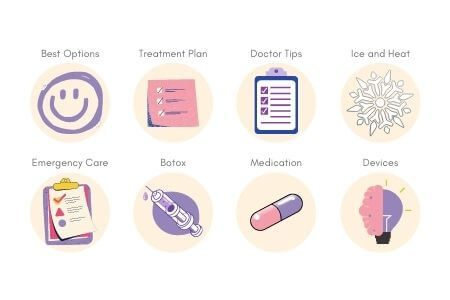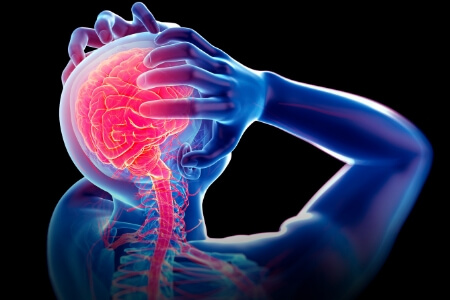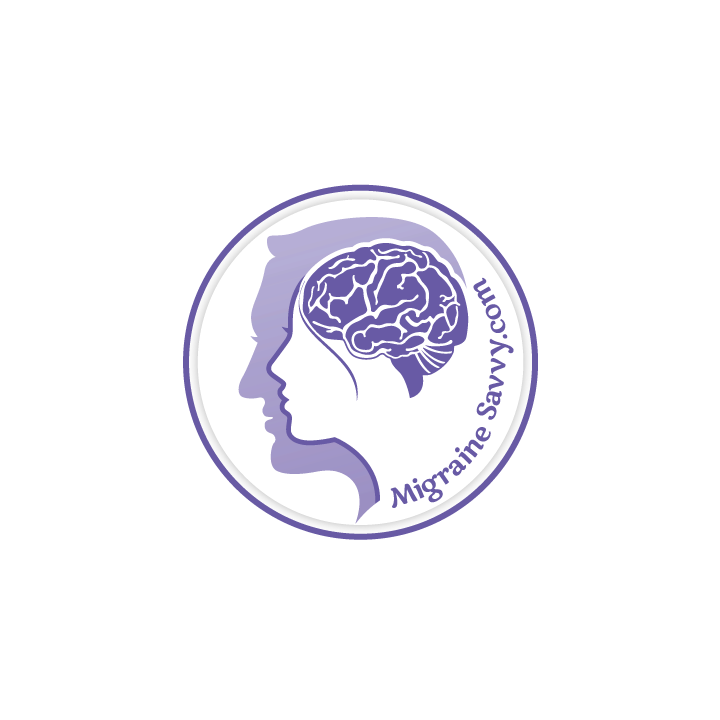- Home
- Migraine Treatments
- Abdominal Migraine Treatment
Abdominal Migraine Treatment: 7 Medications You Need to Know About
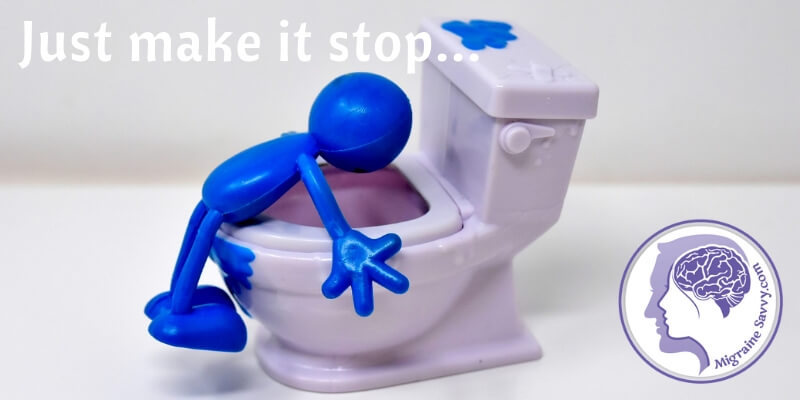
Are you looking for a better abdominal migraine treatment strategy? There are some fundamental principles you need to know, right at the start, for a more successful abdominal migraine treatment.
There are two sides of this you need to consider… one is to reduce the acute attack, and the other is to prepare to prevent or lower the chances of future attacks or episodes.
To date there are no medications that guarantee preventing any future episodes, but many children and adults who suffer with abdominal migraines find pain relief with these medications listed below.
My #1 Choice in Magnesium Supplementation
Abdominal migraines primarily affect children but they also occur in adults.
Diagnosing abdominal migraine can be difficult as stomach pain, nausea and vomiting, that accompany the stomach pain (often without headache) can often be mistaken for infections, flu or gastric problems.
I’ve written more about abdominal migraines: signs to watch for, things your doctor might ask you about, and a bit on alternative treatments here - Are Abdominal Migraines Just An Excuse To Leave School?
Sadly, many children who experience abdominal migraines will also experience other migraines as they grow into adulthood.
In order to help prevent your next attack... let's look more into the fundamentals and then we'll look at all the medication options.
The Fundamentals to Successful Abdominal Migraine Treatment
#1. Start by getting the right diagnosis.
This is often difficult for doctors to diagnose, especially if you as a parent are not familiar with abdominal migraine symptoms. The symptoms so closely resemble ordinary colds and flu, stomach ache and other gastrointestinal diseases.
Knowing about the family history can make a difference in your doctor’s diagnosis, so make sure you check with the elders.
Most likely your Doctor will order a wide range of other tests to eliminate other issues that might be causing the stomach pain. I highly recommend finding a doctor that specializes in migraine, or at the very least has a special interest in migraine. Otherwise, they will be taking their best shot in hopes of getting the right strategy instead of knowing the right strategy.
It's helpful to keep a written record, or diary of your symptoms – their frequency, your pain scale, and physical symptoms. Printing out this migraine diary calendar might be helpful...
Click here to download and print the PDF for the forms I use.
Symptoms you can watch for:
- sudden and severe stomach ache
- nausea and vomiting
- a decreased appetite
- excessive yawning, and tiredness
- unexplained head pain
- whiteness or reddening of the skin
I've written more about the symptoms here - Confusing Abdominal Migraine Symptoms.
Getting the right diagnosis is crucial to getting the right treatment.
#2. Find the right medication.
The medications for abdominal migraine treatment in children are not different to classic migraine treatment in adults.
And remember you have to find the right treatment for acute attacks and preventing future attacks.
The acute medications used are: anti-nausea medications like Phenergan, nonsteroidal anti-inflammatory drugs (NSAIDS) like naproxen or ibuprofen. And the family of triptan medications that target aborting migraines specifically.
Triptan medications now come in different delivery forms. Two are approved by the FDA to treat children so look for a doctor that has past experience with other migraine patients.
The two oral abortive medications are now approved for adolescents are:
- Almotriptan is recommended for ages 12-17
- And Rizatriptan is recommended for ages 6 – 17. Both are on label.
For those kids who can’t tolerate oral – Sumatriptan NS has been studied down to age 6 with Zolmitriptan NS having better absorption so preferable for those weighing under 40 kilograms. Sumatriptan SC is also an option. [2]
Prescribing serotonin blockers or antidepressants is common with an unknown cause.
The nasal form of Sumatriptan is commonly used in older children.
Valproic acid is also a helpful abdominal migraine treatment to reduce pain effectively.
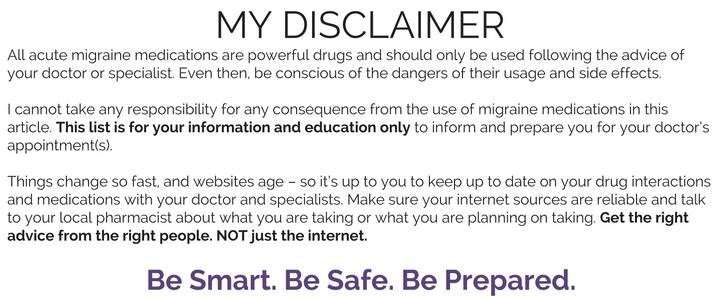
Your List of The Top 7 Abdominal Migraine Treatments
According to Dr. Stoppler at MedicineNet.com, here are the top 7 medications used to treat abdominal migraines: [4]
- Analgesic drugs, such as nonsteroidal anti-inflammatory medications (NSAIDs) or acetaminophen.
- Sumatriptan (Imitrex, Alsuma), a member of the triptan class of drugs used to treat migraine in adults, has been used to treat some older children with abdominal migraine.
- Tricyclic antidepressants and drugs that block the effects of serotonin have been used in some patients to decrease frequency of attacks.
- Valproic acid (Depakote), an anti seizure medication, has been used to treat abdominal migraine.
- Ergotamine medications, also used for adults with migraine, are used to treat some childhood variants of migraine.
- Low dose aspirin and low dose beta-blocker medications have been used over the long term in some patients in an attempt to diminish the frequency of future attacks.
- The antihistamine cyproheptadine has been shown to be effective in some children with migraine variants.
Other aspects of treatment may include the administration of intravenous fluids if vomiting is severe, and the use of sedatives or antiemetic drugs. [4]
Just like other types of migraines, if you know your triggers try your best to avoid them. For example, if you know you react to chocolate (or any food), avoid it where possible.
It is also advisable to learn some good stress management and relaxation strategies.
#3. Be proactive.
Check out my course, the first module is free. Here's the link...
The Triptans You Need to Know About
For Acute Abdominal Migraine Treatment
Abortive medications are for acute treatment of a migraine attack. They are not preventatives that are taken on a daily basis to provide relief. Nor are they painkillers that mask the pain.
The intention and purpose of a triptan is to abort the attack all together. I've written about all the side effects here - Hail The Almighty Triptan.
Here is a quick A – Z list of abortive medications that can be used as abdominal migraine treatment but first...
READ THE WARNINGS
The warnings on your prescriptions are of vital importance.
Please be informed on what you are ingesting and be aware of what to watch for (side effects) if you have an adverse reaction to the medication. Ask your doctor who to call and what to do.
The A - Z List of Triptans Used for Abdominal Migraines
• Almotriptan (Axert®)
Oral dose – 12.5 mgs
Allow 2 hours to take effect
• Eletriptan (Relpax®)
Oral dose – 40 mgs
Takes less than 30 minutes
• Frovatriptan (Frova®)
Oral dose – 2.5 mgs
Allow 2 to 4 hours. It has a 6 hour half life
Frova is often prescribed for period related migraines.
• Naratriptan (Amerge®, Naramig®)
Oral dose – 2.5 mgs
Takes 2 to 4 hours. And 25 hour half life (bonus period of pain relief)
• Rizatriptan (Maxalt®)
Oral dose – 10 mgs
Less than 2 hours
• Sumatriptan (Imitrex®, Imigran®)
This was the first triptan invented.
Oral capsules, nasal spray, injectable.
• Sumatriptan and Naproxen Sodium (Treximet™)
Comes in oral capsules. Contains: Sumatriptan 85 mgs and Naproxen Sodium 500 mgs.
There are strong warnings with this medication. Consult with your doctor when considering this medication for abdominal migraine treatment.
• Zolmitriptan (Zomig®)
Oral Melt and Nasal Spray – 2.5 mgs
The nasal spray should take effect in 15 minutes. Allow 2 hours for the melt.
This medication reports minimal side effects.
Please be careful, I can’t stress that enough. There are different delivery methods for triptans. Nasal spray can be prescribed, or self-injection, or wafer thin dissolving tablets. So check for the latest delivery method. Each one is different.
You may need to experiment to find what works.
Practical Tips For A More Successful Treatment
Let's RECAP:
#1. See your Doctor or specialist for the right diagnosis.
#2. Develop a good pain / symptom management strategy.
#3. Experiment to find what works. Test both medications and natural approaches.
#4. Invest time to learn some good relaxation strategies, or learn to meditate.
#5. Remember sleep can often bring relief from abdominal migraines.
#6. Educate yourself... and learn new coping strategies.
#7. Have confidence you are doing your very best.
Until next time, be well and be pain free.
Ready to take the next step?
Choose the next step that fits where you are right now.
MIGRAINE TREATMENTS Related Articles
Sources:
1. National Headache Foundation (2011) Headache Topic Sheet: Abdominal Migraines [Online], Available at: www.headaches.org/education.
2. Gelfand, Amy MD. (2013) Departments of Neurology and Pediatrics UCSF Child Neurology and Headache Center. Triptans for Kids PDF.
3. American Headache Society (2006) Patient Information: Oral and Intranasal Triptan Therapy for Acute Migraine Headache. Available at: https://www.americanheadachesociety.org PDF (2011).
4. Stoppler, M.C. M.D. at MedicineNet.com (2018) Abdominal Migraine in Children. Available [online] at: https://www.medicinenet.com/abdominal_migraines_in_children_and_adults/article.htm#abdominal_migraine_in_children_facts







